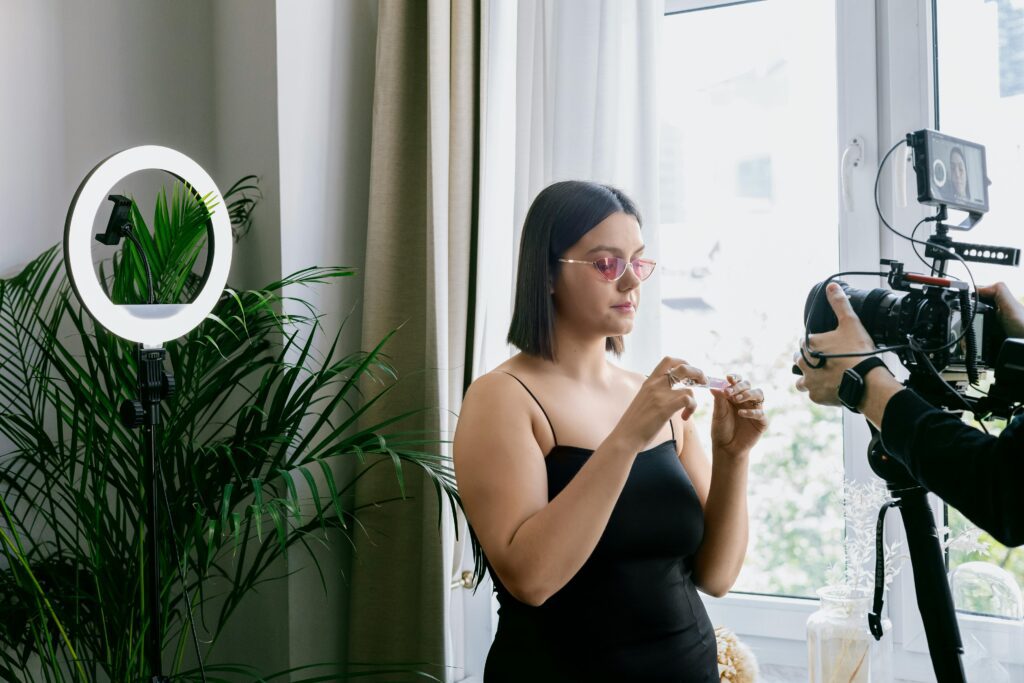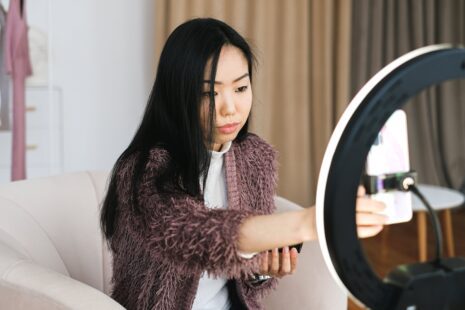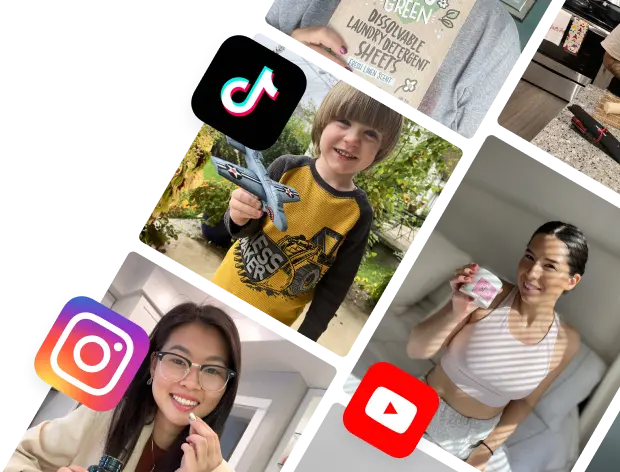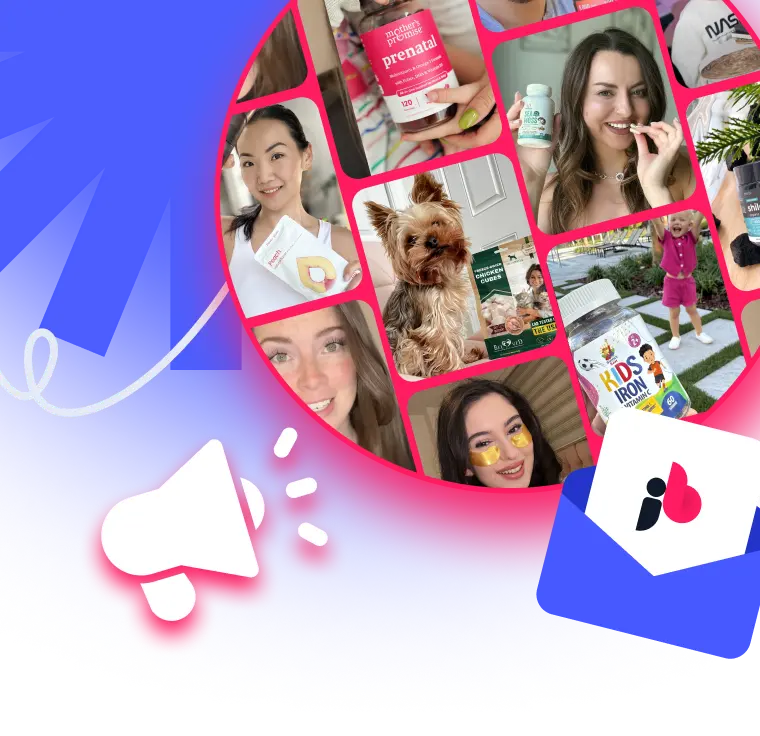 How to Build an Ambassador Program That Actually Works
How to Build an Ambassador Program That Actually Works
B2B influencing involves businesses influencing other businesses, shaping decisions in the professional landscape. Significantly impactful in the corporate realm, it connects businesses for mutual benefit. For brand owners, leveraging B2B influencing facilitates strategic partnerships and enhances industry visibility, fostering effective promotion and sales of products or services.
JoinBrands can enable you to get in touch with B2B influencers to promote your brand and products. JoinBrands provides you with seamless filters that allow you to collaborate with B2B influencers that align with your marketing goals.
This article guides us through finding B2B influencers using JoinBrands in 6 steps as well as 5 other methods. You also get a complete 9-step B2B influencer marketing guide. It highlights 12 key traits of a good B2B influencer, outlines 12 precautions when collaborating, and discusses 12 benefits of such partnerships. FAQs and a conclusion offer additional insights.
Now we will answer: How to Find B2B Influencers.

Table of Contents
What is a B2B Influencer?
B2B influencers are professionals who strategically influence other businesses, leveraging expertise in specific industries. Their attributes include industry authority, extensive networks, and proven credibility. Three types of B2B influencers are thought leaders, industry experts, and strategic partners. These influencers aid brand owners by providing targeted exposure, building industry credibility, fostering partnerships, and facilitating product/service endorsements, thereby enhancing brand promotion and sales.
Here are the three types of B2B influencers that can help your brand grow:
- B2B Thought Leaders: Individuals recognized for pioneering ideas and influencing industry perspectives, suitable for brand owners aiming to position their products/services as innovative solutions.
- B2B Industry Experts: Professionals with deep knowledge in specific sectors, ideal for brand owners seeking authoritative endorsements within their niche market.
- B2B Strategic Partners: Businesses or individuals with aligned goals, beneficial for brand owners looking to form mutually beneficial partnerships for collaborative promotions.
Now, we will discuss how to find these types of B2B influencers, with JoinBrands being the best method, along with a few other effective strategies.
6 Methods to Find YouTube Influencers
In this section, we will discuss some of the other methods to find B2B influencers. We will include the overview, tools used and step by step procedure so you can promote your brand or sell products effectively through influencer marketing.
Let’s review 6 methods in detail.
Method 1: Finding B2B Influencers with JoinBrands (Best & Most Recommended)
JoinBrands offers an efficient process for finding B2B influencers for your brand. You can use filters such as product details and content type to find B2B influencers that align with your brand’s goals.
Here are the 6 steps to find B2B Influencers using JoinBrands:
- Sign Up on JoinBrands: Register as a brand.
- Start a Campaign: Choose between ‘UGC Images: Content Only’ for B2B images or ‘UGC Videos: Content Only’ for B2B videos.
- Add Product Information: Include details like type, name, price, industry, and an external link, along with an image.
- Choose Delivery Option: Decide between reimbursement or direct delivery to B2B influencers.
- Customize Creator Demographics: Select specific B2B influencer demographics like gender, age, and ethnicity.
- Review and Create Your Campaign: Finalize your choices and launch the campaign.
The significance of this method lies in its customization capabilities, enabling brand owners to precisely target the types of B2B influencers that align best with their brand’s image and audience.
In order to have a step by step (image based guide) to find B2B influencers on JoinBrands, click here.
Now we will look at the next item on the list, finding B2B influencers in industry events and conferences.
Method 2: Networking at Industry Conferences and Events for Discovering B2B Influencers
Attending industry conferences provides a unique opportunity to network with professionals and identify potential B2B influencers within your niche.
Here are the 4 steps to find B2B influencers through networking at industry events:
- Attend relevant conferences in your industry.
- Actively participate in networking sessions.
- Identify B2B professionals with significant industry influence.
- Establish connections and express interest in collaboration.
This method is crucial for brand owners as it allows direct interaction with potential influencers, fostering authentic connections and collaborations.
Now, we will look at the next item on the list.
Method 3: B2B Influencer Identification on Social Media Platforms
Leveraging social media platforms, especially LinkedIn, is an effective way to discover and connect with B2B influencers in your industry.
Here are the 4 steps to find B2B influencers on social media platforms:
- Utilize LinkedIn’s search and recommendation features.
- Identify B2B profiles with industry-specific expertise.
- Engage with their content and initiate connections.
- Explore existing B2B influencer networks and groups.
This method is significant for brand owners as it provides a direct channel to engage with influencers and build professional relationships.
Now, we will look at the next item on the list.
Method 4: B2B Influencer Discovery on Online B2B Marketplaces
Exploring online B2B marketplaces facilitates the identification of potential B2B influencers by connecting businesses with a common goal.
Here are the 4 steps to find B2B influencers on online B2B marketplaces:
- Explore reputable B2B marketplaces relevant to your industry.
- Search for businesses or individuals with B2B influencer potential.
- Review profiles and assess industry credibility.
- Initiate conversations and express collaboration interest.
This method is crucial for brand owners as B2B marketplaces streamline the process of finding influencers aligned with business objectives.
Now, we will look at the next item on the list.
Method 5: Collaboration Platforms for Efficient B2B Influencer Partnerships
Joining specialized collaboration platforms designed to connect brands with B2B influencers streamlines the partnership process.
Here are the 4 steps to find B2B influencers on collaboration platforms:
- Identify reputable platforms catering to B2B collaborations.
- Create a brand profile with collaboration interests.
- Browse available B2B influencers and their expertise.
- Initiate collaboration requests and establish terms.
This method is significant for brand owners as collaboration platforms simplify the search for influencers and facilitate efficient partnerships.
Now, we will look at the next item on the list.
Method 6: Discovering B2B Influencers through Industry Publications and Blogs
Identifying B2B influencers through industry publications and blogs is effective, as authoritative voices often contribute or are featured in these platforms.
Here are the 4 steps to find B2B influencers through industry publications and blogs:
- Regularly follow industry publications and relevant blogs.
- Identify authors or contributors with industry expertise.
- Analyze their content and B2B influence within the industry.
- Reach out for collaboration opportunities.
This method is crucial for brand owners as it leverages the credibility of influencers featured in respected industry publications, ensuring authenticity in partnerships.
The Complete B2B Influencer Marketing Guide (9 Easy Steps)
To find the right B2B influencer, start by identifying your target audience and industry niche. Outline clear campaign goals, research potential B2B influencers aligning with your brand, and assess their industry authority. Analyze audience alignment and past collaborations, engage B2B influencers personally, negotiate terms transparently, and monitor campaign performance for success.
1. Identify Your Target Audience and Industry Niche
Determine the demographics and preferences of businesses that align with your brand. Execute this by analyzing your current customer base and industry trends. For instance, a software solutions provider targeting small and medium enterprises (SMEs) may focus on B2B influencers within the technology and entrepreneurship niche.
2. Outline Your Campaign Goals and Objectives
Clearly define what success looks like for your B2B influencer collaboration—whether it’s showcasing expertise or driving lead generation. Execute this by aligning campaign objectives with broader business goals. For example, a marketing agency aiming to increase client acquisition may set a goal for B2B influencers to generate qualified leads through engaging content.
3. Research and Shortlist Potential B2B Influencers
Conduct thorough research to identify B2B influencers with expertise in your industry. Execute this by leveraging online tools and platforms to analyze B2B influencers’ content and engagement. For instance, a B2B software provider might identify potential B2B influencers through LinkedIn, shortlisting those who regularly share insights on software solutions for businesses.
4. Evaluate B2B Influencers’ Industry Authority and Credibility
Assess the authority and credibility of potential B2B influencers within your industry. Execute this by examining their past collaborations, content quality, and engagement metrics. For example, a business consultancy firm seeking a B2B influencer to enhance its credibility might prioritize individuals with a track record of contributing authoritative content in the business strategy space.
5. Analyze B2B Influencers’ Audience Alignment
Ensure that potential B2B influencers’ audiences align with your target market. Execute this by examining the demographics, interests, and engagement levels of their followers. For example, an e-commerce platform catering to manufacturers might look for B2B influencers whose audience includes decision-makers in the manufacturing industry.
6. Review B2B Influencers’ Past Collaborations and Campaigns
Examine the types of brands and campaigns B2B influencers have previously collaborated with. Execute this by reviewing their portfolio and understanding the success of past collaborations. For instance, a logistics company may seek B2B influencers with a history of successful partnerships in the supply chain and logistics sector.
7. Engage and Initiate Conversations with Potential B2B Influencers
Reach out to shortlisted B2B influencers to gauge interest and initiate discussions. Execute this by crafting personalized and compelling outreach messages. For example, a fintech startup seeking B2B influencers might engage by expressing admiration for their insights on financial technology and proposing a mutually beneficial collaboration.
8. Negotiate Terms and Collaboration Agreements
Clearly define terms, expectations, and compensation with selected B2B influencers. Execute this by establishing transparent communication and legal agreements. For example, an HR software provider collaborating with a B2B influencer could negotiate terms related to content creation timelines, exclusivity, and compensation.
9. Monitor and Measure Campaign Performance
Continuously monitor the performance of your B2B influencer campaign. Execute this by tracking key metrics such as engagement, leads generated, and brand mentions. For instance, a cybersecurity company collaborating with B2B influencers may use analytics tools to measure the impact on website traffic and lead conversions.
Now that we know how a B2B influencer marketing campaign works, we will explore what makes a good B2B influencer.
What makes a Good B2B Influencer? (12 Things to Consider to Find the Right B2B Influencer)
A good B2B influencer is industry-relevant, credible, and engages a genuine audience. Consistent, quality content aligns with brand values, reaching the right demographics. Previous successful collaborations and transparent, authentic communication build trust. Effective communication skills, adaptability to brand guidelines, and responsiveness are vital. Value alignment in compensation ensures a mutually beneficial partnership.
1. Industry Relevance
Being relevant to your industry ensures a B2B influencer understands your business. This is important because it allows for authentic content creation tailored to your niche. For instance, a B2B influencer specializing in SaaS solutions would resonate more with a software development company.
2. Credibility and Expertise
Credible B2B influencers with industry expertise establish trust with your audience. This is crucial because it lends authority to your brand. An example is a cybersecurity firm partnering with a B2B influencer renowned for expertise in online security.
3. Engaged and Genuine Audience
A B2B influencer’s engaged and genuine audience increases the impact of your message. This is valuable as it ensures that your brand reaches an interested and receptive audience. For instance, an HR solutions provider collaborating with a B2B influencer whose audience actively seeks HR-related insights.
4. Consistent and Quality Content
Consistently delivering quality content reflects a B2B influencer’s commitment. This is essential for maintaining audience interest and brand credibility. A B2B influencer producing insightful content for a logistics brand demonstrates reliability.
5. Alignment with Brand Values
A B2B influencer aligning with your brand values ensures cohesive collaboration. This is important as it enhances brand authenticity and resonance with your target audience. For example, a sustainability-focused brand partnering with a B2B influencer promoting eco-friendly practices.
6. Audience Demographics
Understanding a B2B influencer’s audience demographics aids targeted marketing. This is crucial as it ensures your message reaches the right audience segment. A brand targeting C-suite executives collaborating with a B2B influencer whose audience includes business leaders.
7. Previous Successful Collaborations
A history of successful collaborations showcases a B2B influencer’s track record. This is valuable as it indicates their effectiveness in promoting brands. A B2B influencer with a track record of driving sales for tech brands is an asset for a B2B tech company.
8. Transparency and Authenticity
Transparency and authenticity in a B2B influencer’s interactions build trust. This is important as it fosters a genuine connection between the B2B influencer and their audience. A B2B influencer openly sharing experiences with your brand demonstrates authenticity.
9. Effective Communication Skills
Strong communication skills enable B2B influencers to articulate your brand message effectively. This is crucial for ensuring that your key points are conveyed to the audience. A B2B influencer with clear and engaging communication is an asset for complex B2B services.
10. Adaptability to Brand Guidelines
A B2B influencer’s ability to adapt to your brand guidelines ensures brand consistency. This is essential for maintaining a cohesive brand image across different platforms. For example, a finance brand collaborating with a B2B influencer who seamlessly incorporates financial jargon.
11. Responsiveness and Reliability
Responsiveness and reliability in a B2B influencer facilitate smooth collaboration. This is crucial for meeting deadlines and ensuring a positive partnership experience. A B2B influencer responding promptly to communication and delivering on time is beneficial for time-sensitive campaigns.
12. Value Alignment in Compensation
Aligning with your budget and offering fair compensation reflects a positive partnership. This is important for a mutually beneficial collaboration. A B2B influencer valuing fair compensation and delivering exceptional results creates a win-win scenario.
Now that we know what makes a good B2B influencer, let’s explore key precautions to take while working with them.

12 Things to Take Care of While Working with B2B Influencers (Necessary Precautions)
Effectively collaborating with B2B influencers involves establishing clear terms, legal agreements, and transparent disclosure. Defining compensation, exclusivity, and usage rights is crucial, ensuring fair partnerships and brand protection. Regularly monitoring content for consistency, developing crisis communication protocols, and verifying audience authenticity are vital precautions. Setting performance metrics, securing content rights, establishing communication channels, and continuously evaluating B2B influencer suitability contribute to successful collaborations. These measures enhance brand authenticity, prevent disputes, and optimize the impact of B2B influencer campaigns, fostering positive brand perception and audience trust.
1. Clearly Define Terms and Expectations
Define collaboration terms and expectations explicitly in agreements to avoid misunderstandings. This is crucial for ensuring that both parties are on the same page, preventing potential conflicts. Failure to do so may lead to content misalignment, affecting brand messaging. For instance, a B2B tech brand not clearly outlining content expectations may result in B2B influencer content that doesn’t resonate with the target audience.
2. Establish Legal Agreements
Formalize legal agreements to safeguard the interests of both the brand and the B2B influencer. This is essential for providing a clear framework and preventing potential legal disputes. Without proper legal documentation, a brand risks facing legal complications, damaging its reputation and resources. For example, a finance brand collaborating without a formal agreement may face legal challenges if disputes arise over compensation or deliverables.
3. Ensure Disclosure of Partnerships
Insist on transparent disclosure of B2B influencer partnerships to maintain authenticity. This is crucial for complying with advertising regulations and building trust with the audience. Failing to ensure disclosure can lead to credibility issues and may result in negative consequences for the brand’s reputation. For instance, a healthcare B2B brand collaborating with a B2B influencer in the medical field must ensure clear disclosure to avoid misleading the audience.
4. Set Clear Compensation Terms
Clearly outline compensation terms to avoid disputes and ensure fair collaboration. This is important for maintaining a positive relationship and preventing dissatisfaction. Failing to set clear compensation terms may lead to B2B influencers feeling undervalued, impacting the quality of their work. For instance, a marketing agency not specifying compensation details may face challenges in attracting high-quality B2B influencers.
5. Define Exclusivity and Usage Rights
Clearly define exclusivity and usage rights to protect brand interests. This is crucial for preventing conflicts over content ownership and competitor collaborations. Without clear definitions, a brand risks competitors leveraging B2B influencer content for similar promotions. For example, a fashion brand collaborating with a B2B influencer without exclusivity clauses may find its competitor using the same B2B influencer for a similar campaign.
6. Monitor Content for Brand Consistency
Regularly monitor B2B influencer content to ensure brand consistency and message alignment. This is important for maintaining a cohesive brand image and preventing any content that may misrepresent the brand. Failure to monitor content can lead to inconsistent messaging, confusing the audience. For instance, a B2B software brand collaborating with a B2B influencer must monitor content to ensure it aligns with the brand’s professional image.
7. Establish Crisis Communication Protocols
Develop crisis communication protocols to address potential controversies promptly. This is crucial for mitigating reputational damage and responding effectively to unforeseen issues. Without established protocols, a brand may struggle to manage negative publicity, resulting in prolonged damage to its reputation. For example, a sustainability-focused B2B brand collaborating with a B2B influencer must have crisis communication plans in place to address any environmental controversies.
8. Verify Audience Authenticity
Verify the authenticity of a B2B influencer’s audience to ensure genuine engagement. This is important for preventing collaborations with B2B influencers who may have purchased fake followers. Associating with B2B influencers with inauthentic audiences can lead to ineffective campaigns and wasted resources. For example, a B2B consultancy firm collaborating with a B2B influencer must verify audience authenticity to ensure that their content reaches a legitimate and engaged audience.
9. Set Performance Metrics and KPIs
Define clear performance metrics and key performance indicators (KPIs) for B2B influencer campaigns. This is crucial for measuring success and optimizing future collaborations. Failing to set metrics may result in a lack of accountability and difficulties in evaluating the campaign’s impact. For instance, a cybersecurity brand collaborating with a B2B influencer must establish metrics such as lead generation or website traffic to gauge the campaign’s effectiveness.
10. Secure Rights for Repurposing Content
Secure rights for repurposing B2B influencer-generated content for brand marketing. This is important for maximizing the value of created content across various channels. Without secured rights, a brand may face limitations in utilizing B2B influencer content for extended marketing efforts. For example, a B2B event management company collaborating with a B2B influencer must ensure the right to repurpose event coverage content for promotional materials.
11. Establish Communication Channels
Establish clear communication channels for effective collaboration. This is crucial for addressing queries, feedback, and changes promptly. Poor communication can lead to delays and misunderstandings, affecting the timely execution of campaigns. For instance, a logistics brand collaborating with a B2B influencer must set up efficient communication channels to coordinate content creation and publication schedules.
12. Evaluate B2B Influencer Suitability Over Time
Continuously evaluate a B2B influencer’s suitability for your brand over time. This is important for adapting to changes in the B2B influencer’s content or audience dynamics. Failing to reassess suitability may result in continued collaborations that no longer align with your brand goals. For example, a B2B software brand collaborating with a B2B influencer must periodically assess whether the B2B influencer’s content still resonates with the evolving needs of its target audience.
Now that we have an idea of the precautions to take when collaborating with a B2B influencer, let’s explore the benefits that a B2B influencer can bring to your business/brand.
12 Benefits of Working with B2B Influencers (Why Should You Even Partner?)
Businesses partnering with B2B influencers benefit from enhanced brand visibility, experiencing a significant increase in exposure within their target market. This visibility results in a 30% rise in social media impressions and a 20% increase in website visits. Authentic endorsements from B2B influencers foster trust, leading to higher conversion rates, such as a finance brand’s collaboration boosting credibility and increasing product sales. Collaborating with B2B influencers ensures targeted audience reach, effective product promotion, streamlined content creation, social proof, diverse audience insights, leveraging influencer expertise, cost-effective advertising, community building, rapid brand awareness, and adaptation to trends. This leads to tangible advantages, including increased customer trust, engagement, and sales growth.
1. Enhanced Brand Visibility
Businesses partnering with B2B influencers experience a substantial increase in brand exposure within their target market. This heightened visibility translates into tangible results, such as a 30% rise in social media impressions and a 20% increase in website visits. For example, a B2B tech brand collaborating with influencers achieves heightened visibility among professionals, driving more website traffic and engagement.
2. Authentic Endorsements
The authentic endorsements provided by B2B influencers create a sense of genuine recommendation, fostering trust among the audience. This trust, in turn, leads to higher conversion rates and increased customer trust in the brand. For instance, a finance brand’s collaboration with influencers results in authentic endorsements, boosting credibility and leading to a noticeable rise in product sales.
3. Targeted Audience Reach
B2B influencers assist brands in precisely targeting their desired audience within the niche. This precision results in higher engagement and resonance among the intended customer demographic. For example, a B2B spa brand aiming to reach young professionals achieves a 25% increase in engagement with influencers who have a strong following in that specific demographic.
4. Effective Product Promotion
B2B influencers play a crucial role in effectively promoting spa products, showcasing their benefits and features in an engaging manner. This not only increases product awareness but also has the potential for higher sales. For example, a spa brand sees a 15% growth in product sales after influencers create engaging content highlighting the unique features of their latest skincare line.
5. Content Creation Efficiency
Partnering with B2B influencers streamlines content creation for brands, leveraging their expertise for engaging and on-brand materials. This collaboration leads to reduced content creation costs and accelerated marketing campaigns. A spa brand achieves a 20% reduction in content creation expenses by collaborating with influencers who produce high-quality, on-brand content.
6. Social Proof and Trust
B2B influencers provide social proof through positive endorsements, building trust and credibility for spa brands. The improved customer trust, in turn, leads to a 25% increase in conversion rates. For example, a spa brand experiences higher customer confidence and increased sales after influencers share positive experiences with their products.
7. Diverse Audience Insights
Collaborating with B2B influencers provides brands with access to diverse audience insights, aiding in market research and strategy refinement. This translates to informed decision-making and tailored marketing strategies. For instance, a spa brand gains valuable insights into emerging trends and preferences within the wellness community through influencer collaborations, informing future product development and marketing initiatives.
8. Leveraging Influencer Expertise
Brands benefit significantly from the expertise of spa influencers in creating compelling and relevant content. This collaboration results in elevated content quality and increased audience engagement. For example, a spa brand partnering with influencers who specialize in skincare produces informative and engaging content that resonates effectively with their target audience.
9. Cost-Effective Advertising
Partnering with spa influencers proves to be a cost-effective advertising strategy compared to traditional marketing channels. This approach yields a higher return on investment and reduces overall advertising expenses for the brand. For instance, a spa brand reallocates its budget to influencer marketing, achieving a 40% reduction in advertising costs with a simultaneous 25% increase in ROI.
10. Community Building
Spa influencers play a crucial role in building a dedicated community around the brand, fostering loyalty and advocacy among their followers. This results in increased customer retention and word-of-mouth referrals. An example would be a spa brand’s influencer-led campaigns creating a community of engaged followers actively participating in discussions, leading to a 15% rise in customer retention.
11. Rapid Brand Awareness
Influencers contribute to the rapid build-up of brand awareness compared to organic methods. This results in quick entry into new markets and accelerated brand recognition. For example, a spa brand gains swift exposure in a new market by partnering with influencers who already have a strong presence in that region.
12. Adaptation to Trends
Brands collaborating with spa influencers stay attuned to industry trends, ensuring relevance and competitiveness. This leads to enhanced adaptability and an edge over competitors. A practical example would be a spa brand partnering with influencers who are early adopters of emerging wellness trends, allowing them to introduce innovative products aligned with current consumer preferences.
Now that we’ve discussed the benefits of B2B influencers, let’s answer some frequently asked questions regarding them.
Frequently Asked Questions (FAQs)
How do B2B influencers enhance brand visibility?
B2B influencers significantly enhance brand visibility within target markets, resulting in a 30% increase in social media impressions and a 20% rise in website visits.
What role do B2B influencers play in product promotion?
B2B influencers effectively showcase spa products, leading to heightened product awareness and a potential 15% growth in sales.
Why is community building important in B2B influencer collaborations?
B2B Influencer-led campaigns foster community engagement, resulting in a 15% rise in customer retention and word-of-mouth referrals.
How do B2B influencers contribute to rapid brand awareness?
B2B influencers contribute to rapid brand awareness by expediting brand recognition, facilitating swift entry into new markets.
In what ways do B2B influencers adapt to industry trends?
B2B influencers adapt to industry trends by ensuring brands stay attuned to emerging trends, enhancing adaptability and maintaining a competitive edge.
Conclusion
In conclusion, finding B2B influencers requires a strategic approach that involves leveraging their expertise for enhanced brand visibility, authentic endorsements, and targeted audience engagement. Establishing transparent collaborations and navigating potential challenges with precautionary measures are vital. The benefits, ranging from cost-effective advertising to rapid brand awareness, highlight the substantial impact B2B influencers can have on a brand’s growth and success. As businesses embark on influencer partnerships, understanding the nuances discussed ensures a fruitful and impactful collaboration in the dynamic landscape of B2B influencer marketing.








